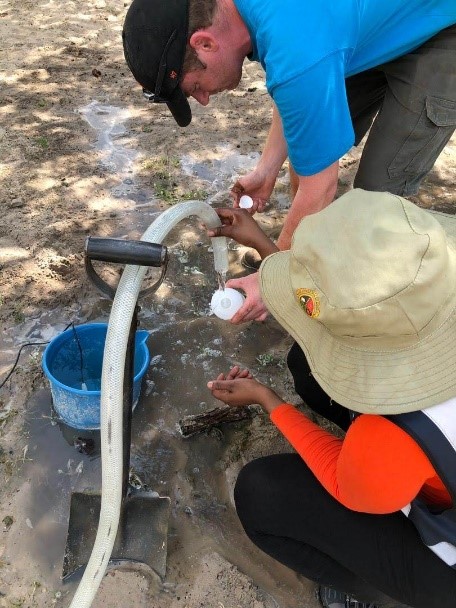Women must lead Africa’s water resources decisions for improving management
Posted in : Blog on 10 March 2021
On International Women’s Day, Cooperation in International Waters in Africa (CIWA) celebrates women’s pivotal role in the transboundary water resources management and advocates for their larger participation in the decision-making process.
Reginalda Joseph, an alumna of the Southern Africa Development Community (SADC)- Groundwater Management Institute (GMI) ‘s Young Professional (YP) program shares her experience. She explains why more women must take charge and lead the decision-making process in the water sector.
1. Tell us about yourself.

I hold an Honours degree in Geology and a Master’s degree in Petroleum Geology from the University of Namibia. I am currently working as a Hydrogeologist in the Department of Water Affairs in the Ministry of Agriculture, Water and Land Reform in Namibia.
As a citizen of the country, I am aware of the country’s water situation. Namibia is one of the driest countries in Southern Africa and therefore, highly depends on groundwater.
A few years ago, as water shortages due to drought made headlines on the daily news, I started thinking about contributing to the sector. This event motivated me to specialize in groundwater investigations and management. Being part of an industry that helps improve the livelihoods and quality of life is arguably one of the most meaningful careers one can choose.
2. How was your experience as SADC-GMI YP? What did you learn from the internship program?
My experience was remarkable; I met fellow young professionals from other SADC member countries with different educational backgrounds and experiences in the water sector. It was a platform where we shared our knowledge and experiences. This program enhanced my understanding of how groundwater professionals can use different methods to manage their groundwater resources better.
The program was a mix of classroom and online learning. The one online course I enjoyed the most was the use of Geographic Information System (GIS) as an effective tool for investigating and managing groundwater.
The program also allowed us to the SADC Grey Literature Archive, making it a fully functional online archive on groundwater literature for the SADC region. This archive is vital, especially for young professionals, as it gives us access to literature which enhances our knowledge to support the equitable and sustainable use and management of groundwater.
3. How has the YP helped you in your current role?
I use the knowledge and skills attained in the program daily at work. For example, as a Hydrogeologist, the GIS course has immensely benefited me as I can now quickly develop maps for fieldwork. Also, having access to the archive has enabled me to access groundwater reports and studies that guide me to prepare reports and understand how things are done in other SADC countries to manage groundwater better.
4. How are women currently contributing to transboundary water management and cooperation in Africa?
Although still under-represented, women are specializing in an affiliated topic and conducting water-related investigations to help solve transboundary water issues management. Women are actively participating in the transboundary water committees where they are helping with the studies and management of such resources.
For example, in the Division of Geohydrology in the Department of Water Affairs, where I work, the majority of staff are professional women, including in leadership positions. Young women are given space and opportunities to grow professionally. These women are also part of transboundary water committees where they help in investigations, manage water resources, and implement policies and laws to safeguard water resources. Women play a crucial role in disseminating knowledge, raising awareness through their networks, and educating the next generation on water resources management.
5. As a woman, what challenges have you faced as a professional, and how did you overcome these?
One of the main challenges I faced as a young professional, especially when I joined the sector, was my lack of confidence, and, at the same time, the need to find opportunities to build strong skills and experience.
I overcame these challenges by capacitating myself, strengthening my skills, reading as much as possible, and proactively signing up for short courses online on groundwater studies and management. I made sure I attended as many conferences and workshops as possible, focusing on groundwater.
I ended up getting several opportunities to present my work, and in 2019, I received the Best Young Professional Presenter at the 2019 SADC-GMI Conference in Johannesburg.
6. Why should women join the transboundary water resources sector? What should be done to encourage their greater participation in the future?

Women play a prominent role in the productive use and management of water resources through various activities such as domestic work, farming, fishing etc. They are key holders of knowledge on water use and sharing. Their contribution goes far beyond water use as they effectively manage water, yet, women have been historically disadvantaged due to gender stereotypes and social-cultural norms. Water governance and policies need to be more responsive to the existing differentiated gender roles and responsibilities in projects and institutions, so that women can step up and demand their seat at the decision-making table.
I believe that there is a need to offer opportunities to women to strengthen their skills and access to information, knowledge, and technology through training and education for building their confidence and acquire professional experience. It is time for women to pursue careers and take on leadership positions in the water sector.
Organizations like CIWA play a critical role in mainstreaming gender and social inclusion by identifying obstacles at transboundary levels and recommending ways to solve these issues through a transformative approach. It provides funding, empowers women by building their capacities, improves access to services and information, and helps stakeholders understand certain norms that affect gender equality and offers approaches to address these.
Governments must implement policies focusing on building women’s technical capacities, recruiting, and promoting women in water resources management to address their historical disadvantage in decision-making to motivate them to join the industry.


